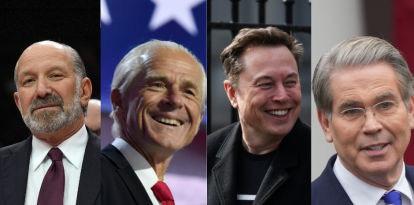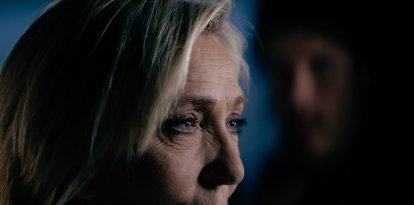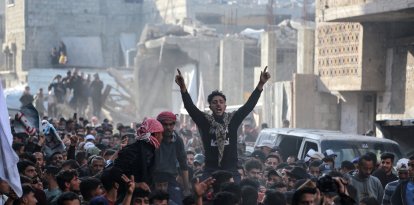Does NATO have much of a future?
No wonder Donald Trump called the alliance obsolete and Emmanuel Macron claimed it was “brain dead.”

(KENZO TRIBOUILLARD / AFP)
Today, April 4, the North Atlantic Treaty Organization (NATO) its 75th anniversary. As a tribute to its longevity, foreign ministers gathered in Brussels (Belgium) to pay tribute. Later in July, with better weather, a summit will be held in Washington D.C. It will be hosted by Biden. He will be in the middle of his presidential race and we can expect all kinds of babbling, errors and confusion.
Obviously, NATO will not invite Donald Trump, because it is an intergovernmental organization and because, theoretically, it neither wants nor can interfere in the political processes of its members. But, with the fear that the European allies have of a possible return of Donald to the White House, they could have come up with a good excuse not to further increase their instinctive animosity towards an alliance that they see as obsolete, irrelevant and deeply unfair.
Be that as it may, NATO is going to celebrate itself. First, because of what is considered a successful past. It likes to make the world believe that the military organization defeated the USSR without firing a single shot, even though the USSR fell prey to its own contradictions, which were exacerbated by Ronald Reagan's policies. These policies were reviled and resisted by European allies. But hey, now is not the time to dismantle the myth of Atlantic victory.
After the collapse of the USSR, NATO entered a period of uncertainty about its purpose, which was only resolved thanks to the outbreak of conflict in the Balkans and the development of a new doctrine focusing not on deterring Russia, but on supporting peace support missions. While this support sometimes evolved into enforcing peace, (under the leadership of Spanish socialist Javier Solana), NATO's achievements were mixed. The war against Milosevic lasted 77 days, despite heavy bombing of a weakened and besieged enemy. The air campaign was plagued by fatal errors such as the accidental bombing of the Chinese embassy in Belgrade and a civilian train. This serves as a reminder, especially amid current events where reactions are strong, such as the recent incidents involving Israel and the accidental deaths of seven workers from an organization associated with Spanish-American chef José Andrés. Such incidents underscore the harsh realities of war.
After the events of 9/11, NATO invoked Article 5 for the first time, which calls for direct assistance to a member under attack, but it had few practical consequences. NATO was then not in the position to support President Bush's campaign in Afghanistan and instead focused on its role in stabilization and peacekeeping efforts, which ultimately fell short despite collective efforts.
After the Iraq war in 2003, it could be argued that NATO largely fell apart, driven by Jacques Chirac's Gaullist anti-Americanism and Berlin's pacifist apathy. When NATO eventually became involved, it was primarily to assist in training and instructing an Iraqi Army that existed only on paper.
The intervention in Libya in 2011, theoretically orchestrated to avoid a humanitarian catastrophe, was also undertaken by a minority of member states, led by the United Kingdom and France and with Barack Obama “leading from the back seat.” This highlighted immediate shortcomings in European allies' military capabilities, as they quickly ran out of missiles shortly after the campaign began. The strategic outcome was nothing short of disastrous: Libya plunged into total chaos for years.
In the same year, 2008, Putin launched his first imperialist adventure by invading Georgia, a country with which NATO had begun to adopt an ambiguous approach. However, since Georgia was not a member of the alliance, NATO refrained from intervening. Then, in 2014, the "little green men" appeared in Crimea and eastern Ukraine, marking a second imperialist assault by the Kremlin. Ukraine had also been given ambiguous responses regarding its potential accession to NATO. Despite escalating rhetoric and criticism of Putin's actions, NATO hesitated to take decisive action, given that Ukraine was not a member of the alliance. Even the downing of the Dutch airliner MH17 by a Russian missile over Ukrainian territory failed to prompt NATO mobilization against Russia.
It is not surprising that, with this story, Donald Trump called NATO obsolete and Emmanuel Macron claimed that it was “brain dead.”
Just when everything seemed on the verge of collapse, particularly in Europe, amid profound mental and material disarmament, Vladimir Putin emerged as a decisive factor. In February 2022, he initiated a “special military operation,” aimed at overthrowing Zelensky's government and integrating Ukraine into Russian territory, prompting a sudden awakening in the Western world. The United States and Europe swiftly imposed sanctions against Moscow. As Kyiv continued to resist against all odds, discussions that previously seemed like a lost cause turned toward providing military aid to Ukraine to halt Putin's expansionist ambitions.
But, far from doing what would be coherent, giving more weapons and perhaps, as the French president suggested, sending soldiers to Ukraine, as soon as Putin shakes the bag of nuclear apocalypse, NATO will withdraw. Far from dissuading Moscow, the alliance has given ample evidence these two years of being self-dissuaded.
Let's be clear: NATO did nothing to deter Putin from invading Ukraine. Neither its military deterrence nor its political resolve proved credible. While allies now boast that without them Putin would be dining peacefully in Kyiv, the reality after two years of war offers little positive for celebration.
Certainly, allied armies bolstered their presence along NATO's borders with Russia, with some claiming credit for preventing a Russian attack. Yet it remains unclear whether Putin ever intended to target a NATO member. Success in deterrence is often claimed in the absence of enemy action.
In any case, what is event is that the world's largest and best war machine, the United States and its NATO allies, with defense spending ten times higher than that of Russia, with more motivated and better-trained soldiers, with unparalleled equipment, has made limited progress in repelling Russia from Ukraine. Russians remain entrenched on a front similar to two years ago, and they are not under the impression they've lost the war. Instead, allied capitals increasingly fear Kyiv cannot win.
Here's a revised version of your text for better readability and clarity:
Let's be clear: NATO failed to deter Putin from invading Ukraine. Neither its military deterrence nor its political resolve proved credible. While allies now boast that without them Putin would be dining peacefully in Kyiv, the reality after two years of war offers little cause for celebration.
Certainly, allied armies bolstered their presence along NATO's borders with Russia, with some claiming credit for preventing a Russian attack. Yet it remains unclear whether Putin ever intended to target a NATO member. Success in deterrence is often claimed in the absence of enemy action.
What is evident, however, is that the world's largest and most advanced war machine—the United States and its NATO allies, with defense spending ten times that of Russia—has made limited progress in repelling the invader in Ukraine. Russian forces remain entrenched on a front similar to two years ago, without feeling they've lost the war. Instead, allied capitals increasingly fear Kyiv cannot win.
Despite escalating rhetoric and increased support for Ukraine, including direct aid and military equipment, NATO's actions tether its future to a Russian defeat in Ukraine. Countries are under the impression that if Putin wins, we all lose.
But, far from doing what would be coherent, giving more weapons and perhaps, as the French president suggested, sending soldiers to Ukraine, as soon as Putin shakes the bag of nuclear apocalypse, NATO will withdraw. Far from dissuading Moscow, the alliance has given ample evidence these two years of being self-dissuaded.
You should not make promises that you cannot or do not want to keep. And, honestly, if you asked a Spanish, Italian or German citizen if they were willing to die for the Donbas, I would imagine that the answer would be a resounding no, no matter what their leaders say at NATO headquarters in Brussels.
A Spanish general once said that NATO's greatest threat isn't Putin, who has managed to get even the Nordics to abandon their traditional neutrality and join the bandwagon. Donald Trump is an even bigger threat. He will withdraw underperforming allies if they do not meet defense spending commitments made in the 70s to allocate 2% of their GDP to defense spending. The irony is stark: those demanding more defense are seen as NATO's main threat.
Until Trump's anticipated victory materializes, NATO can continue to quietly celebrate its lengthy and supposedly successful existence. The Spanish military has benefited from NATO's internalization of command posts and deployments. It enabled training opportunities that would have been unthinkable within Spain's budget constraints outside the alliance.
But what is good for the military is not necessarily good for the nation's defense. In fact, NATO's influence has resulted in the dismantling of Spain's critical defense apparatus needed to prepare for potential confrontations in the south, particularly with Morocco. While Spain has been supportive and played its part globally, including succumbing to the prevailing anti-Russian sentiment, even though artificially manufactured and embraced by a self-centered prime minister, this has led to neglecting what was once called “the specific threat” to Spain. The state of our military capabilities for defending our strategic interests in our vulnerable southern flank is still a concern.
Now, on its 75th anniversary, NATO's gaze is fixed eastward while the South becomes a secondary concern. This is especially true if you take into account that the most important ally, the United States, has an excellent relationship with Morocco, even better than with Spain, not to mention France. If we are not able to deter Russia, it will be due to a collective failure. But the fact that we cannot dissuade Rabat is entirely our responsibility. Let us not be blinded by NATO's celebrations.
RECOMMENDATION





















